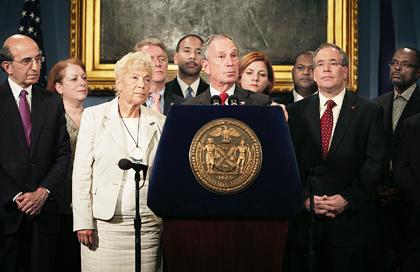By Anna Gustafson
The embattled state Senate may be moving closer to approving a revised version of mayoral control, which ended last week after state lawmakers failed to renew the school governance law, state Sen. Toby Stavisky (D-Whitestone) said.
“They’re negotiating changes to the Assembly’s bill,” Stavisky said of the legislation that passed the Assembly in June. “The changes are to enable parents to have more input and have more say in various educational policy issues. I was very upset because parents felt they were being totally ignored, and they were.”
Despite last-minute pleas from Gov. David Paterson and Mayor Michael Bloomberg, Senate lawmakers did not vote to reauthorize mayoral control, which Bloomberg and city Schools Chancellor Joel Klein have said allowed the city to leave behind a corrupt, dysfunctional Board of Education to a system that has propelled more students to graduate and earn better state test scores.
The city’s first Board of Education since the 2002 implementation of mayoral control convened July 1 and unanimously elected Deputy Mayor Dennis Walcott, a Cambria Heights resident, as president.
The board includes Walcott, who was appointed by Queens Borough President Helen Marshall, and two other deputy mayors, Edward Skyler and Patricia Harris. Bloomberg appointed Skyler and Harris.
Manhattan Borough President Scott Stringer appointed his general counsel, Jimmy Yan to the board; Brooklyn Borough President Marty Markowitz appointed his chief of staff, Carlo Scissura; Bronx Borough President Ruben Diaz Jr. appointed the former president of Hostos Community College, Dolores Fernandez; and Staten Island Borough President James Molinaro appointed his first deputy borough president, Edward Burke.
All board members but Fernandez voted for the immediate return of mayoral control and the group unanimously agreed to retain Klein as chancellor — a move that state Assemblyman Rory Lancman (D-Fresh Meadows) criticized, saying it seems to give Bloomberg more power than he had under mayoral control.
“People who opposed mayoral control were happy to see it expire because they thought it would restore a golden age of parental involvement,” Lancman said. “The day after mayoral control expired, the mayor is more firmly in control of the Department of Education than ever before. Three of his deputy mayors on the board, the community school boards don’t exist, and the board has delegated all authority to the mayor’s appointed chancellor. A few weeks from now the mayor might think he likes the old system better.”
Rob Caloras, a Bayside resident and former president of Community Education Council 26, slammed Marshall’s decision to appoint Walcott to the board.
“Helen Marshall is doing Queens County a tremendous disservice,” Caloras said. “How can she appoint someone who works for the mayor to be her representative? Clearly he won’t be her representative or Queens County’s representative. He will be Mayor Bloomberg’s representative.”
Bloomberg said the board will serve as the public schools’ governing body until “Albany rectifies its inaction and reauthorizes mayoral control.” The board will not reconvene until September.
“The Senate has, through its inactions, handed our city a current governance structure not too dissimilar from the governance structure of the Senate, one made up of multiple and conflicting lines of authority, certainly the formula for gridlock,” Bloomberg said. “The temporary school board has attempted to sidestep the worst consequences, but as prudent as its actions have been, bear this in mind: These are Band-aids, not solutions. Now we all need to keep the pressure on the state Senate to act.”
Reach reporter Anna Gustafson by e-mail at agustafson@cnglocal.com or by phone at 718-229-0300, Ext. 174.



































